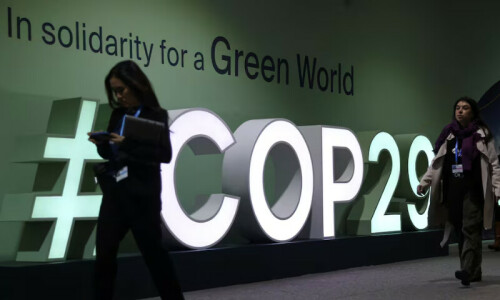
PROTECTION of life and liberty occupies a paramount position within the constitutional frameworks of democratic states. In Pakistan, these guarantees form the basis of the Constitution’s chapter on fundamental rights.
Resultantly, superior courts have extended the ambit of these rights beyond a mere vegetative existence to a life that is meaningful, and worth living. Therefore, under the Constitution, deprivation of life is dealt with utmost caution and is exercisable only under exceptional circumstances and through judicial pronouncements.
Human error, however, remains inevitable. The application of the death penalty in Pakistan is replete with routine miscarriages of justice. In October 2016, the Supreme Court acquitted two brothers from Bahawalpur, only to find that they had been executed the year before.
The presidency has rejected 513 mercy petitions over the last five years.
Under these circumstances, the Constitution provides an additional safeguard — the president’s power to pardon. India’s supreme court in Shatrugan Chauhan vs Union of India defined the constitutional power of mercy as of “a nature entirely different from judicial power”. According to the court the power is not a “private act of grace” but belongs to the people and is vested in the state.
Pakistan’s criminal justice system fails to uphold key procedural and substantive safeguards. The effective exercise of mercy as a check to judicial error is critical to avoid miscarriages of justice.
In fact, in 2006, a full bench of the Supreme Court ruled that the president’s power to pardon was unfettered and unrestrained with respect to death sentences awarded as tazir punishments — which religion does not specify as a fixed punishment.
However, following the lifting of the moratorium on executions in December 2014, and over 491 executions in less than four years, not a single mercy petition has been accepted by the president. The presidency has rejected 513 mercy petitions over the last five years, 444 of which were in the 15 months after the resumption of executions. As party to the UN International Covenant on Civil and Political Rights (ICCPR), Pakistan must ensure that clemency for death-row prisoners is a meaningful remedy. The Human Rights Committee in its Initial Review of the Government of Pakistan observed that the “blanket refusal” of all mercy petitions since December 2014 was evidence of its lack of effectiveness as a safeguard against wrongful executions.
According to Justice Project Pakistan’s report No Mercy: A Report on Clemency for Pakistan’s Death Row, jail authorities filing mercy petitions on behalf of prisoners often submit a brief pro-formo which is merely a perfunctory account of judicial proceedings. The petition makes no mention of mental disability status, medical conditions, age at the time of arrest, length of time on death row or any other mitigating factor justifying a lesser sentence.
Abdul Basit is a paraplegic prisoner on death row who became paralysed after contracting tuberculosis meningitis because of unhygienic conditions in Faisalabad Central Jail. A mercy petition on grounds of ill health was refused in 2015 because the jail had not provided certified copies of his government medical records.
Additionally, there is no fixed time limit for deciding mercy petitions. So, the presidency can delay a decision indefinitely. India’s supreme court has ruled that inordinate delay in deciding mercy petitions is grounds for the commutation of a death sentence. However, no such precedent exists in Pakistan.
Kanizan Bibi was sentenced to death for murder in 1999. According to her father, the real culprits were initially arrested but released upon a bribe. Subsequently, the police filed a false report against Kanizan, a maid in the house of the deceased. She was tortured so severely by the police for a confession that her screams were heard throughout the village.
The abuse severely affected her mental health, and she was, eventually, diagnosed with severe schizophrenia. Her condition continues to worsen and she has not spoken a word for the last 12 years. However, no mercy has been extended.
It is clear that reform is necessary to ensure that clemency is a meaningful safeguard against wrongful convictions. The government should ensure more transparency in the process by instituting an executive committee comprising of members of the ministries of human rights and interior, the presidency, Federal Treaty Implementation Cell, and Office of the Attorney of Pakistan. The committee should be forwarded all relevant judicial and personal records of prisoners seeking mercy and make a determination.
It is only when protective mechanisms are in place that the constitutional scheme functions on the basis of mercy mandated under Islam, human rights and the principles of justice followed by civilised nations.
The writer is head of advocacy for Justice Project Pakistan.
Twitter: @ZainabQ
Published in Dawn, April 8th, 2018










































